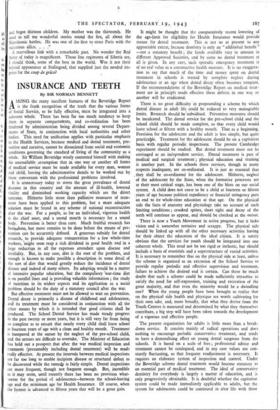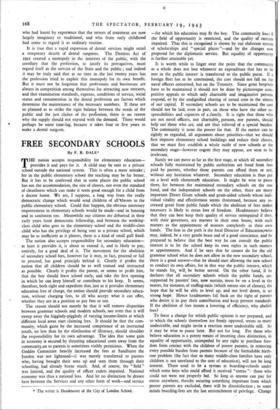INSURANCE AND TEETH
By SIR NORMAN BENNETT
It is unnecessary today to stress the great prevalence of dental diseases in this country and the amount of ill-health, lowered vitality and diminished working capacity which are the direct outcome. Hitherto little more than palliative measures of treat- ment have been applied to this problem, but a more adequate solution must be found in any scheme of national reconstruction after the war. For a people, as for an individual, vigorous health is the chief asset, and a sound mouth is necessary for a sound body. Prevention is better than cure. Much fruitful research has beensclone, but more remains to be done before the means of pre- vention can be accurately defined. A generous subsidy for dental research, to provide adequate remuneration for a few whole-time workers, might soon reap a rich dividend in good health and in a large reduction in all the expenses attendant upon disease and invalidity. But, in any case, diet is the root of the problem, and enough is known to make posiible a description in some detail of the sort of diet that would .greatly reduce the incidence of dental disease and indeed of many others. Its adoptioil would be a matter of intensive popular education, but the compulsory "war-time diet is on parallel lines and is providing valuable information ; the study of nutrition in its widest aspects and its application as a social problem should be the duty of a statutory council after the war.
But effective treatment must not be allowed to wait on prevention. Dental decay is primarily a disease of childhood and adolescence, and its treatment must be considered .in conjunction with all the other means by which it is intended that good citizens shall be produced. The School Dental Service has made steady progress in the past twenty or more years, but it is still very far from being so complete as to ensure that nearly every child shall leave school at fourteen years of age with a clean and healthy mouth. Treatment is hampered at the outset by the neglect of the pre-school child, and the arrears are difficult to overtake. - The Minister of Education has held out a prospect that after the war medical inspection and treatment (presumably including dental treatment) will be made really effective. At present the intervals between medical inspections are far too long to enable incipient disease or structural defect to be discovered while the remedy is fairly simple. Dental inspections are more frequent, though not frequent enough. But, incredible as it may seem, until recently there has been no provision what- ,oever for the period of adolescence—between the school-leaving sge and the minimum age for Health Insurance. Of course, when the former is advanced to fifteen years that will be a great gain. It might be thought that the comparatively recent lowering of the age-limit for eligibility for Health Insurance would provide means for dental treatment. This is nct so at present to any appreciable extent, because dentistry is only an " additicinal benefit " —not a statutory benefit ; the funds available vary in amount in different Approved Societies, and by some no dental treatment at all is given. In any case, such sporadic emergency treatment is of no real value as a constructive health measure. It is no exaggera- tion to say that much of the time and money spent on dental treatment in schools is wasted by complete neglect during adolescence at an age when dental decay often becomes rampant. If the recommendations of the Beveridge Report on medical treat- ment are in principle made effective these defects in one way or another will be eradicated.
There is no great difficulty in propounding a scheme by which dental disease in adult life could be reduced to very manageable limits. Research should be.subsidised. Preventive measures should be inculcated. The dental service for the pre-school child and the school child should be made complete, so that every child would leave school at fifteen with a healthy mouth. That as .a beginning. Provision for the adolescent and the adult is less simple, but quite practicable. Treatment for the adolescent should be on a capitation basis with regular periodic inspections. The present Cambridge experiment should be studied. But dental treatment must not be envisaged as an independent service. Dental treatment is part of medical and surgical treatment ; physical education and training is another part. In the schools these services, though in many respects inadequate, are co-ordinated. It is just as essential that . they shall be co-ordinated for the adolescent. Hitherto, neglect of the adolescent by the State, when the formative processes are at their most critical stage, has been one of the blots on our social system. A child does not cease to be a child at fourteen or fifteen _years of age because political expediency or financial stringency puts an end to its whole-time education at that age. On the physical side the facts of anatomy and physiology take no account of such limiting conditions ; crooked spines, short sight and decay of the teeth will continue to appear, and should be checked at the outset.
There is now a Youth Movement in active progress, but it lacks vision and is somewhat tentative and scrappy. The physical side should be linked up with all the other necessary activities having for their object the education of the ideal citizen. It is surely obvious that the services for youth should be integrated into one coherent whole. This need not be too rigid or inelastic, but should include a basis of essentials and a superstructure of varied activities. It is necessary to remember that on the physical side at least, unless the scheme is organised as an extension of the School Service to provide regular periodic and effective supervision and treatment, failure to achieve the desired end is certain. Can there be much doubt that such a scheme could be made sufficiently attractive to satisfy the need for self-expression, training and recreation of the great majority, and that even the minority would be a dwindling one? When the young people have been brought to realise that on the physical side health and physique are worth cultivating for their own sake, and, more broadly, that what they derive from the Youth Centres is measured and determined by what they themselves contribute, a big step will have been taken towards the development of a vigorous and effective people.
The present organisation for adults is little more than a break- down service. It consists mainly of radical operations and does nothing to encourage periodic conservative treatment, and tends to have a demoralising effect on young dental surgeons from the schools. It is based on a scale of fees ; professional advice and treatment cannot be catalogued, and in any case values are con- stantly fluctuating, so that frequent readjustment is necessary. It requires an elaborate system of inspection and control. Under the Beveridge scheme dental treatment would become statutory as an essential part of medical treatment. The ideal of conservative dentistry for everybody is largely a matter of education, and is only progressively obtainable. It is doubtful whether the capitation system could be made immediately applicable to adults, but the system for adolescents could be continued in after life with those who had learnt by experience that the terrors of treatment are now largely imaginary or traditional, and who from early childhood had come to regard it as ordinary routine.
It is true that a rapid expansion of dental services might entail a temporary dearth of dental surgeons. The Dentists Act of x921 created a monopoly in the interests of the public, with the corollary that the profession, to justify its prerogatives, must regard itself as the servant of the State and the public ; and indeed it may be truly said that at no time in the last twenty years has the profession tried to exploit this monopoly for its own benefit. But it must not be forgotten that professions and businesses are always in competition among themselves for attracting new entrants, and that examination standards, expense, conditions of service, social status and remuneration in the dental profession are factors which determine the maintenance of the necessary numbers. If these are so planned as to strike the right balance between the needs of the public and the just claims of the profession, there is no reason why the supply should not expand with the demand. There would perhaps be some time-lag, because it takes four or five years • to make a dental surgeon.



























 Previous page
Previous page